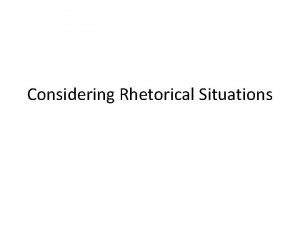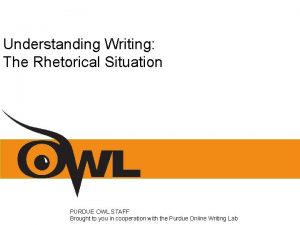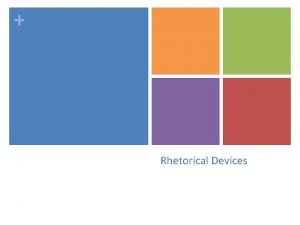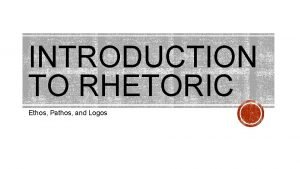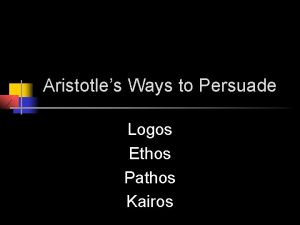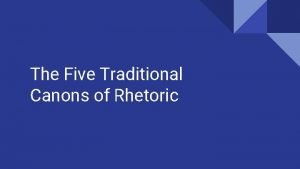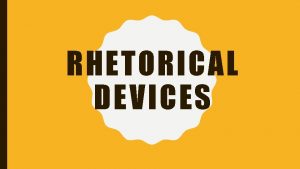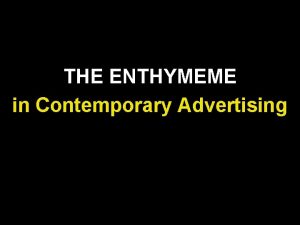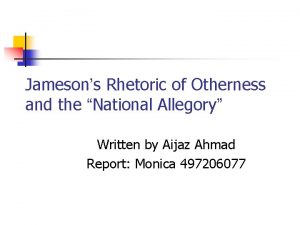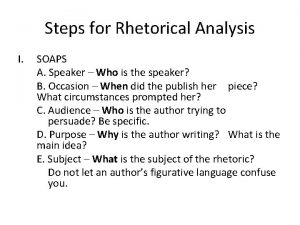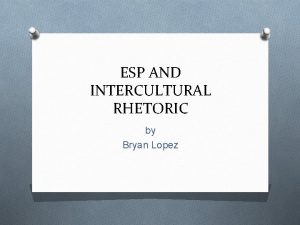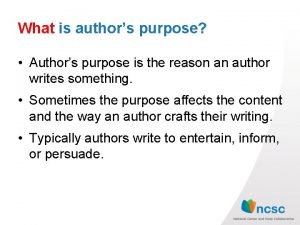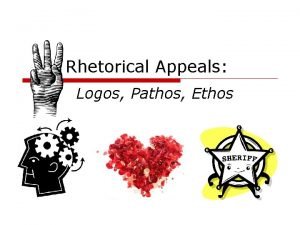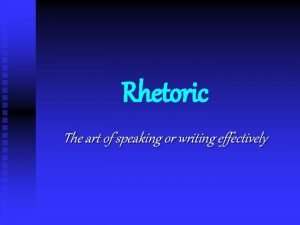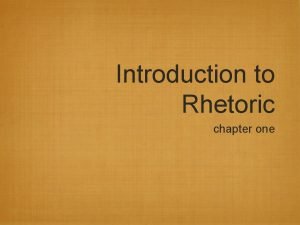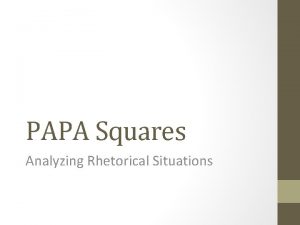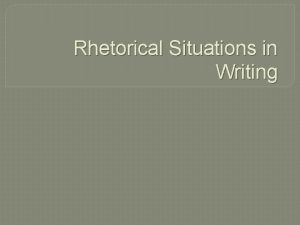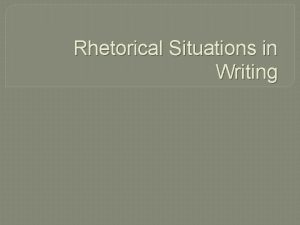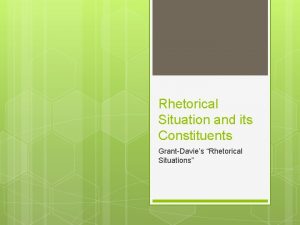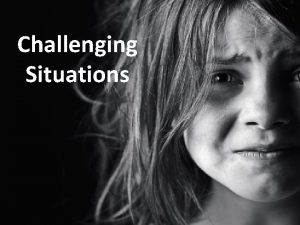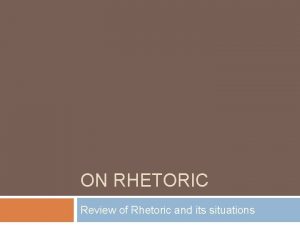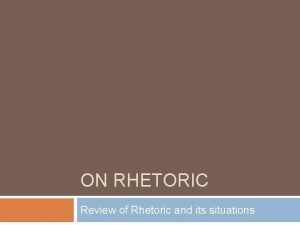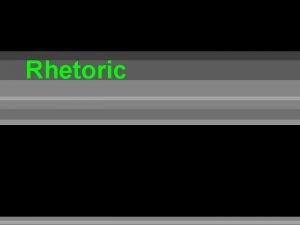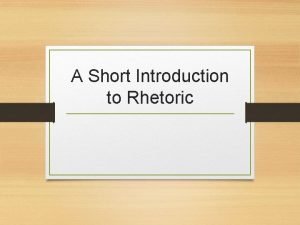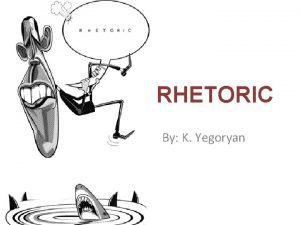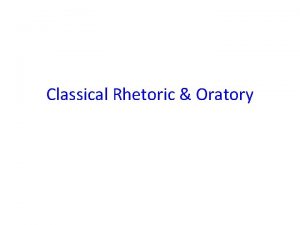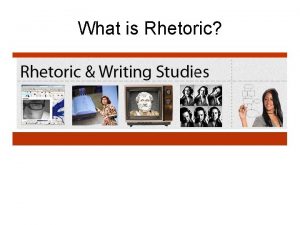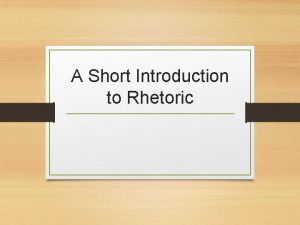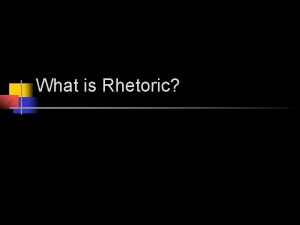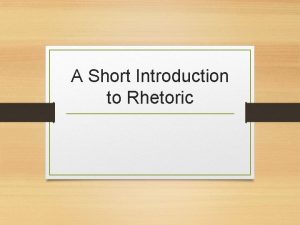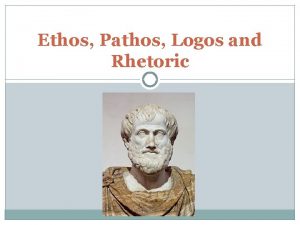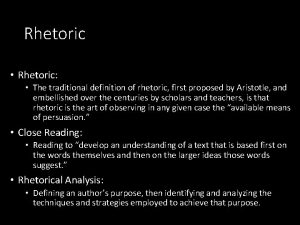Rhetoric Rhetorical Situation Rhetorical Situation Rhetorical Situations consists
























- Slides: 24

Rhetoric

Rhetorical Situation

Rhetorical Situation • Rhetorical Situations consists of the context of the argument • Consists of: • Exigence (Issue) • Audience • Purpose

Rhetorical Situation: Exigence • Problem, incident, or situation causing the writer to write the piece • What made the author write this?

Rhetorical Situation: Audience • Who is the author writing for? • An audience has either an: • Immediate response • Intermediate response (think about later) • So, which type of response does the author want from the audience?

Rhetorical Situation: Purpose • The author has purpose of the writing based on what he wants the audience to feel. • Why did the author write this piece of work?

Rhetorical Appeals • Author persuades or convinces his audience by making appeals: • Logos = Logic • Ethos = Ethics, Image • Pathos = Emotions (Passion)

Rhetorical Appeals: Logos • Logos is an appeal to logic. Logos is an argument based on facts, evidence and reason. • The central appeal of anything is that it must be logical. • Without logic, nothing that follows is reasonable.

Logos

Ethos • Ethos is an argument based on character. The writer or speaker appeals to the audience’s sense of ethical behavior. • The writer or speaker presents him or herself to the audience as credible, trustworthy, honest and ethical. • Ethos can also be thought of as the role of the writer in the argument, and how credible his/her argument is. • “I am an ethical expert, so believe what I say. ”

Ethos

Pathos • Pathos is an argument based on feelings • An attempt to persuade the reader by causing them to respond to the way an issue/topic makes them feel • Can invoke bias or prejudice • Uses non-logical appeals • Informal language • Pathos can also be thought of as the role of the audience in the argument.

Pathos

Tone • You must understand Logos, Ethos, and Pathos to understand the Tone • Logos, Ethos, and Pathos all contribute to determining the Tone • If you don’t recognize the Tone of the piece, you miss everything that follows

What is Tone? • The writer’s or speaker’s attitude toward a subject, character, or audience • Conveyed through the author’s: • Choice of words (diction) • Word order (syntax) • Detail, imagery, and language (figurative language)

Rhetorical Devices

Rhetorical Devices • Rhetorical devices are techniques writers use to enhance their arguments and make their writing effective.

Rhetorical Devices • Rhetorical Devices are techniques the author uses to persuade or convince the reader and get his point across • Repetition • Parallelism • Rhetorical Question • Argument by Analogy • Loaded Words • Irony

Repetition • Repetition is the repeated use of a word, phrase, or clause more than once for emphasis. • Example: • The curfew law should be repealed—repealed immediately in fairness to the community, the police and the students.

Parallelism • Parallelism is the repetition of the same grammatical form to express equal, or parallel ideas. A noun is paired with a noun, a phrase with a phrase, a clause with a clause, and so on. • Example: • This week, the Riverdale High School student council had to cancel its annual charity Bowl-a. Thon—not because of a lack of interest, not because of a shortage of funds, and not because of a failure to sign up enough enthusiastic volunteers.

Rhetorical Question • Rhetorical questions are questions that are not meant to be answered but are asked for effect. • Example: • Should students who are out late because of such events be jailed or fined? • Should such school activities be dropped?

Argument by Analogy • Argument by analogy draws a parallel between basically dissimilar events or situations. • Example: • If the curfew law aims to reduce youth crime, it mistakenly targets the wrong hours. It is much like shutting the corral gate after the horses have escaped.

Loaded Words (Diction) • Loaded words carry strong emotional associations. • Examples: • Our baseball team won the tournament, pulverizing the Brantley County Herons in the final.

Irony • Irony: expression of something which is contrary to the intended meaning; the words say one thing but mean another. *Yet Brutus says he was ambitious; And Brutus is an honourable man. -- Shakespeare's Mark Antony in "Julius Caesar"
 What is a rhetorical situation definition
What is a rhetorical situation definition Genre and rhetorical situation
Genre and rhetorical situation Purdue owl rhetorical situation
Purdue owl rhetorical situation Example of rhetorical patterns
Example of rhetorical patterns Rhetorical situation analysis
Rhetorical situation analysis Rhetoric
Rhetoric Pathos rhetoric definition
Pathos rhetoric definition Kairos in advertising
Kairos in advertising Canons of rhetoric
Canons of rhetoric Whats logos in writing
Whats logos in writing Appeals logos
Appeals logos Define parallelism rhetorical device
Define parallelism rhetorical device Enthymemes in advertising
Enthymemes in advertising National allegory examples
National allegory examples Space cat ap lang example
Space cat ap lang example Rhetoric literary devices
Rhetoric literary devices Soaps rhetoric
Soaps rhetoric Intercultural rhetoric examples
Intercultural rhetoric examples What is the author's purpose? *
What is the author's purpose? * Ethos logos pathos
Ethos logos pathos Ethos rhetoric
Ethos rhetoric Pick it up rhetoric
Pick it up rhetoric Art of speaking and writing
Art of speaking and writing How is rhetoric defined in this chapter?
How is rhetoric defined in this chapter? Purdue owl visual rhetoric
Purdue owl visual rhetoric
